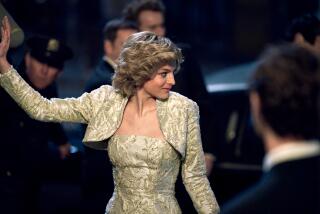MOVIE REVIEW : ‘King George’ a Real Royal Treat : Nigel Hawthorne’s Potent Portrayal Gives Humanity to Monarch’s Fall Into Dementia
Late in 1788, in the 28th year of the reign of England’s King George III, something extraordinary happened: As one modern historian’s tactfully puts it, “The king’s mind broke down.” A bizarre kind of dementia overtook the monarch who had already lost the American Colonies, and everyone who was anyone in the country’s ruling circles was faced with a crisis beyond all imagining.
As if to prove that the unlikeliest material can make for the best films, “The Madness of King George,” directed by Nicholas Hytner from Alan Bennett’s prize-winning play, has taken this footnote to history and transformed it into one of the triumphs of the year--potent, engrossing and even thrilling to experience.
This is due in great measure to Nigel Hawthorne’s work as the deranged monarch, a heroic performance that enlarges our understanding of what acting can accomplish. A recent arrival at celebrity, the 65-year-old Hawthorne swept his country’s major theatrical awards when he played the part on the London stage. And Hytner, who directed that version as well, has ensured that his interpretation was transferred to the screen with its intensity intact.
Although not as celebrated here as he is back home, writer Bennett (who has a brief cameo as a mild member of Parliament) is one of Britain’s most respected men of letters. Discerning folk will remember him as the screenwriter for the Joe Orton biography, “Prick Up Your Ears,” and the Alan Bates-starring “An Englishman Abroad,” as well as for being one of the nonpareil quartet (along with Peter Cook, Dudley Moore and Jonathan Miller) that made the Beyond the Fringe satirical troupe so brilliant.
What Bennett has done in “Madness” is to powerfully re-imagine the atmosphere of George’s royal court, giving the dialogue a modern twist while keeping it from sounding anachronistic. The pleasure he takes in the spoken word, his ability to etch characters in both acid and compassion, to write such lines of dialogue as “the state of monarchy and the state of lunacy share a frontier” set this film thankfully apart.
Confessing, in the play’s introduction, that he has “always had a soft spot for George III,” Bennett introduces the monarch at the height of his powers. A genially choleric man, bluff, gruff and plain-spoken, he is proud of his popularity with the common folk but is a trial to his 15 children, especially his bored-to-death heir, the Prince of Wales (Rupert Everett).
Setting a hectic pace and ending most sentences with a speedy “What, what?” the king’s energy looks even greater than it is because he is surrounded by effete whiners and smooth careerists. Except for Greville (Rupert Graves), his loyal equerry, everyone, including ice-cold Prime Minister William Pitt (Julian Wadham), is both irritated and comforted by the knowledge that they are more sophisticated than their ruler.
George’s most heartening and moving relationship is with his Queen Charlotte, beautifully played--albeit with welcome dramatic license (the real queen was said to be “as dull as she was ugly”)--by Helen Mirren. Never apart for so much as a day in their 28 years of marriage, they call each other “Mr. King” and “Mrs. King” in private and still seem very much in love.
Then, with almost no warning, the madness begins, difficult to detect at first because, as one character asks, “Who can say what is normal to a king?” But after bouts of waking everyone up at 4 a.m., screaming fits about nonexistent floods and zealous sexual attacks on the attractive Lady Pembroke (Amanda Donohoe), one of the queen’s attendants, there can no longer be any doubt that the monarch is not himself.
When the king’s condition becomes known, the political maneuvering begins in earnest. For if Parliament declares George unfit to rule and the noxious Prince of Wales is installed as regent, Pitt will be out and the hungry opposition, led by the troublesome Charles James Fox (Jim Carter), will take power.
In the meantime, George’s condition is made worse by the barbaric treatments, verging on medieval torture, that his crackpot Three Stooges medical team inflict on him. Finally, as a last resort, he is put in the hands of Willis (Ian Holm), a former clergyman with unusual ideas about the treatment of the mentally ill.
It is a measure of Hawthorne’s performance in the title role that, like King Lear (who is pointedly referred to), the worse his condition becomes, the more he inspires our sorrow and pity. His madness adds to his moral stature by making him increasingly human, and we root for him with a surprising passion to recover his wits. Meanwhile, the looks of confused horror and self-loathing that flit across his ravaged face express torment as heartbreakingly as acting is able to.
Director Hytner, known for his stage work on “Miss Saigon” and “Carousel,” is so at home with film that it is difficult to believe this is his feature debut. Working with cinematographer Andrew Dunn and Oscar-winning production designer Ken Adam (“Barry Lyndon”), he has faultlessly opened up the play and made a distant world seem physically real. Down to its final footnote on modern theories about the cause of the royal illness, every aspect of “The Madness of King George” keeps us amused, surprised and delighted. Who wouldn’t wish long life to a film as worthy as this?
* No MPAA rating. Times guidelines: adult themes and situations and graphic scenes of torturous medical treatments.
(BEGIN TEXT OF INFOBOX / INFOGRAPHIC)
‘The Madness of King George’ Nigel Hawthorne: King George III Helen Mirren: Queen Charlotte Ian Holm: Willis Amanda Donohoe: Lady Pembroke Rupert Graves: Greville Rupert Everett: The Prince of Wales A Close Call Films production, in association with Channel Four Films, released by the Samuel Goldwyn Co. Director Nicholas Hytner. Producers Stephen Evans, David Parfitt. Screenplay by Alan Bennett, based on his play “The Madness of George III.” Cinematographer Andrew Dunn. Editor Tariq Anwar. Costumes Mark Thompson. Music adapted by George Fenton. Production design Ken Adam. Supervising art director Martin Childs. Art director John Fenner. Set decorator Carolyn Scott. Running time: 1 hours, 50 minutes.
* Playing at the Goldwyn Pavilion Cinemas, Westside Pavilion, Pico and Westwood boulevards, West Los Angeles. (310) 475-0202.
More to Read
Only good movies
Get the Indie Focus newsletter, Mark Olsen's weekly guide to the world of cinema.
You may occasionally receive promotional content from the Los Angeles Times.











